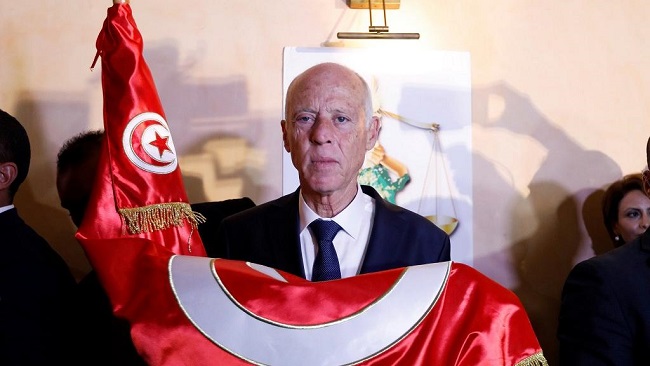Tunisian president Saied promises to name a PM but maintains emergency measures
Tunisian President Kais Saied vowed Monday to appoint a prime minister but said emergency measures that he announced in July would remain in place.
“These exceptional measures will continue and a prime minister will be named but on the basis of transitional rulings responding to the will of the people,” he said in a televised speech from Sidi Bouzid, the cradle of Tunisia’s 2011 revolution.
On July 25, Saied sacked the government, suspended parliament, removed lawmakers’ immunity and put himself in charge of the prosecution.
He has since renewed the measures for a second 30-day period, and had not responded to calls for a roadmap for lifting them.
Saied has repeatedly insisted his actions are in line with the North African country’s post-revolution constitution, under which the head of state can take “exceptional measures” in case of an “imminent danger” to national security.
Speaking to a large crowd on Monday, Saied, a bitter opponent of the country’s parliamentary system, said the legislature had turned into “a marketplace where votes are bought and sold”.
“How can they be representatives of the people while their votes in parliament are bought and sold and sittings are paused so the price can be agreed?” he asked.
The crowd repeatedly interrupted his speech with the shouts of “the people want parliament to be dissolved.”
National television station Watania, which broadcast the speech live, repeatedly cut out and eventually promised to broadcast a recorded version, prompting mockery online.
‘Selling the country’
Saied, a political outsider, came to power in 2019 on a wave of public outrage against political parties widely seen as corrupt and self-serving.
Without naming his opponents, on Monday Saied accused “traitors” of “selling the country”.
“This is not an issue of a government but of an entire system,” he said.
He repeated three times: “Sovereignty belongs to the people!”
Saied delivered his speech to a noisy crowd in front of Sidi Bouzidi’s municipality where Mohamed Bouazizi, a vegetable salesman angered by police harassment, set himself ablaze in December 2010.
Bouazizi’s act triggered an unprecedented uprising that left some 300 people dead and toppled long-time dictator Zine El Abidine Ben Ali, sparking a string of revolts across the region.
Tunisia has won praise for its democratic transition but a decade on, many Tunisians feel their quality of life has worsened in the face of grinding economic, social and political crises, exacerbated by the coronavirus pandemic.
Many Tunisians took to the streets on July 25 in support of Saied’s moves.
But rights groups have warned that measures including military trials of some Saied opponents reflect a worrying trend towards authoritarianism.
The measures have also received stinging criticism from his arch-foe, the Islamist-inspired Ennahdha party, which formed the largest bloc in parliament before its dissolution by the president.
Several hundred protesters, many of them Ennahdha supporters, marched through central Tunis on Saturday to demand a return to parliamentary democracy.
Source: AFP




